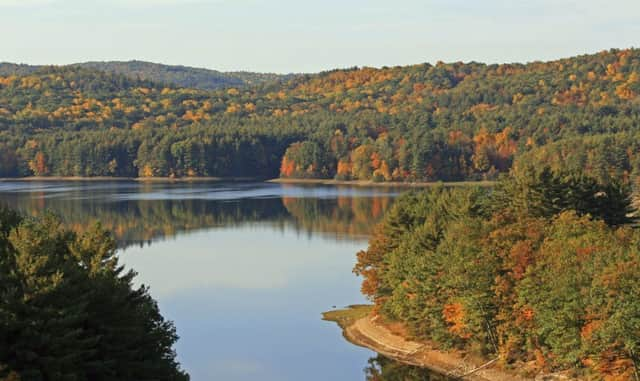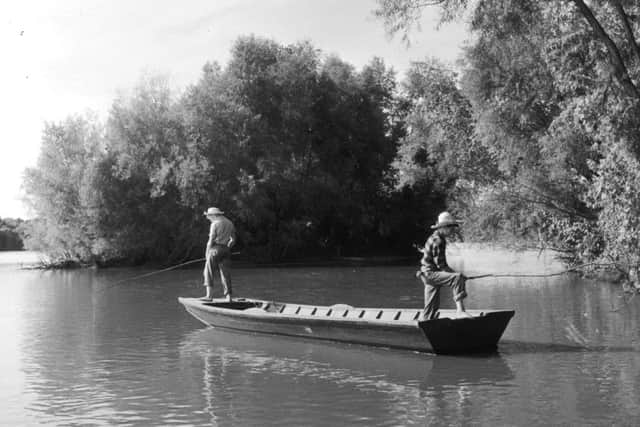Ashley Davies: Dawning of a new life on the river


This time last week, while you may have been in the office fantasising about stapling a colleague’s hand to their desk or staring in disbelief out of the window at what passes for summer round these parts, I was floating on my back down three miles of the Farmington River in Connecticut. It confirmed something I’ve long suspected – that following a river and contemplating its nature, purpose and all the life in and around it – is sublime.
For the record, there was some kit keeping me afloat – I was river tubing, which involves lying in a big, sturdy, inflated ring that looks like a brightly coloured inner tube from the ridiculous sort of vehicles favoured by Chris Eubank.
Advertisement
Hide AdAdvertisement
Hide AdYou hop into your tube, get a small shock when your bottom touches the cold water, paddle to the middle of the river then pretty much let the power of nature pull you downstream for a couple of hours, sometimes through dramatic rapids that can topple the unwary – and whose invisible rocks can give one’s buttocks a battering to rival the handiwork of the most sadistic and frustrated Dickensian school master – but mostly through tranquil pools of peaceful loveliness.


There were dozens of other people around me but I was able to float away and spend much of the time alone with my thoughts and the magic of the water, and, for a few precious moments, I couldn’t imagine ever being happier.
There were occasions on which I was able to trust the water, close my eyes, relish the warming sun on my grateful face and be certain about the direction in which I was travelling; to hear nothing but the gurgle, trickle and murmur of the liquid, the breeze in the trees and the chatty birds. But I also knew I needed to open my eyes every now and then to make sure I wasn’t heading for a face-smack of white water or a low-hanging branch that might skewer an eyeball. How’s that for a clunky, heavy-handed metaphor, hey?
Every half hour or so I’d float past people going about their leisurely business on the riverbank. In one scene that had a smoky whiff of Huckleberry Finn about it, I spotted a dad and his two pre-teen boys, one of whom was so skinny his shoulder blades were almost poking out of his skin. The other was a lot better upholstered, and they were poking around in the shallows when suddenly they yelled out in triumph. I called out to ask why they were celebrating and – as if we were old friends – the beefy boy shouted excitedly: “We caught a crayfish. We’re going to cook it in a LOT of butter!” He jumped up and down splashily and unselfconsciously, jiggling with glee. The dad was proud and happy and bursting with love.
A little while later, I floated past a fisherman, loaded down with expensive-looking accoutrements. I asked what he was hoping to catch and, without even looking up and barely even opening his mouth, he muttered “trout”. He wasn’t here to chat.
The next riverfolk I encountered were 20 or so shirtless, sunburnt men ranging in age from about 15 to 40, some of whom had the tell-tale red eyes that indicate indulgences of a particular kind, accompanied by three or four thin, busy, dogs that were delirious with delight about the sensory overload. The older men were grilling the fish they’d caught and I actually heard one use the term “brewski” without irony – an anthropological delight. One of them said he’d give the other $5 if I didn’t capsize at the next rapids, but I didn’t care and kept on floatin’.
Gliding along a particularly tranquil area, I gazed at the sky and let my eyes rest on three enormous eagles enjoying the thermals on this hot afternoon. Lucky birds. Lucky me.
I lost myself in the amniotic allure of the water – silvery on the shimmery surface and translucent caramel underneath. It transported me back to panning for gold in the African rivers with my dad as a child – a glinty, time-consuming treasure hunt that generated far fewer spoils than the crayfish family yielded.
Advertisement
Hide AdAdvertisement
Hide AdI passed young sweethearts holding hands as they floated downstream; I smiled at their love and they smiled back. I passed an older couple playing what I now know to be “river jazz” quietly on their boat, which towed a small trailer of libations to enhance their experience.
The beauty, mystery and power of water has stimulated writers, artists and musicians through the ages, whether they examine the role of the river as transport, or focusing in on the life therein. In Landmark, his delicious book about nature writing, Robert Macfarlane says of writer and environmentalist Roger Deakin: “Deakin thought not just about water, he thought in water and with water. His imagination was watery not in the sense of dilute, but in the sense of ductile, mobile, lucid, reflective. ‘All water’, he wrote in a notebook, ‘river, sea, pond, lake, holds memory and the space to think’.”
Macfarlane revels in the words used across the British Isles for messing about in water: “dooking” here in Scotland; “bumbelling” in Shetland; “jabblin” or “puddling” in Galloway and having a “kite” or a “squashie” in Northern Ireland and Kent respectively.
People immediately feel part of a community when they’re on the water. Wave at someone in a boat and he or she will always wave back. Need help? You’ll get it.
And the metaphorical power of rivers is clear and irresistible. As Heraclitus wrote: “No man ever steps in the same river twice, for it’s not the same river and he’s not the same man.” And it’s so easy to see why the river is so strong a symbol of spiritual cleansing – you never feel quite so clean as you do when you’ve been in one. It’s sharp, soft, dangerous and comforting.
And perhaps more than anything, it must be the biological imperative – the drive of living organisms to perpetuate their existence – that draws us towards natural, clean water. That, and the romance of it all. Take me to the river.